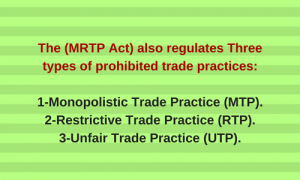MRTP act- Monopolies and Restrictive Trade Practices act 1969
INTRODUCTION:
MRTP Act (Monopolies and Restrictive Trade Practices Act) was passed by Parliament.The act came into force on 1st June 1970. The act aims to prevent concentration of economic power, provide for control of monopolies, and protect consumer interest.Monopolies and Restrictive Trade Practices Act(MRTP Act) got the President’s approval on December 27, 1969.
The (MRTP Act) also regulates Three types of prohibited trade practices:
1-Monopolistic Trade Practice (MTP).
2-Restrictive Trade Practice (RTP).
3-Unfair Trade Practice (UTP).
1-Monopolistic Trade Practice (MTP):
Monopolistic Trade Practice, The objective of such practices is to eliminate competition, take advantage of monopoly and charge unreasonably high prices. This training additionally falls apart the item quality, limit technical development, prevent competition and adopt unfair trade practices.
2-Restrictive Trade Practice (RTP):
A trade practice, which prevents, distorts or restricts competition in any manner; or Obstructs the flow of capital or resources into the stream of production; or Which tends to bring about manipulation of prices or conditions of delivery or which affects the flow of supplies in the market of any goods or services, imposing on the consumers unjustified cost or restrictions.
Unfair Trade Practice (UTP):
An unfair trade practice means a trade practice, which, for the purpose of promoting any sale, use or supply of any goods or services, adopts the unfair method.Regulation of production and fixing the term of sale.Prohibiting any action that restricts competition.Fixing standards for goods produced etc.

QUESTION/ANSWER
Q1-The act came into force on-
Ans- 1st June 1970.
Q2. Which year (MRTP Act) got the President’s approval on-
Ans- December 27, 1969.
I’m Nitesh Brithwal Nanu , An Indian Engineer who is passionate about technology , current affairs , general Knowledge & programming . Constantly learning and experiencing new things.





Comments